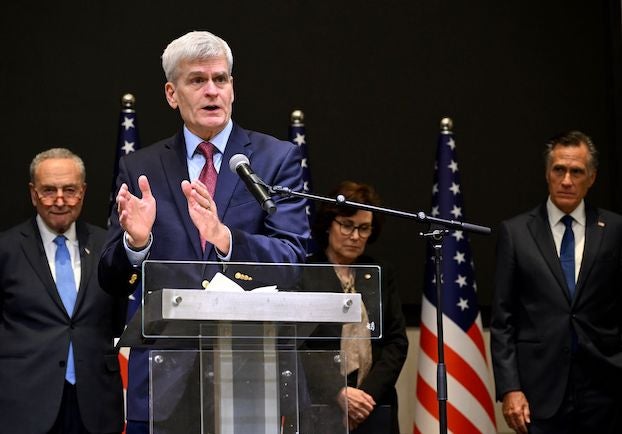Cassidy, Kennedy return from Asia as part of bipartisan delegation aiming to reduce tensions with China
Published 10:22 am Friday, October 20, 2023

- U.S. Sen. Bill Cassidy. (Special to the American Press)
Last week, U.S. Sen. Bill Cassidy, R-La., alongside five other senators, participated in a bipartisan delegation to China, Japan and South Korea to discuss issues relating to fentanyl production, promote trade and reduce tensions with China.
Alongside Cassidy were U.S. Senate Majority Leader Chuck Schumer (D-NY), U.S. Sen. John Kennedy (R-La.), U.S. Sen. Mike Crapo (R-Idaho), U.S. Sen. Maggie Hassan (D-NH) and Georgia U.S. Sen. Jon Ossoff (D-Ga.).
During the delegation, they met with China’s President Xi Jinping “to improve lines of communication between our two countries,” Cassidy said during a press conference on Tuesday.
“There is a lot of tension between the two countries. People talk about us going to war. We should not go to war. We should do everything we can to stop that,” he later told the American Press.
He said that it is paramount for the United States to cooperate with China when possible.
“China is the second largest economy in the world. They are not going away, ever. They are a talented people. They are good people. It is the Chinese Communist Party that is creating the problems. We need to continue to work with China.”
During the meetings, the delegation encouraged the Chinese Communist Party “to improve their behavior and find out how our two countries can work together.”
“In some places, we are going to confront each other. Other places, we’ll compete and other places we will cooperate. We want to maximize where we cooperate and where we compete, and make sure that the competition doesn’t lead to confrontation that doesn’t have to be.”
In the United States, approximately 80,000 people experience fatal overdoses, he said. A major topic of conversation was reducing the export of chemicals used to create fentanyl from China.
Many of the chemical that are used to produce fentanyl are shipped out of China to Mexico, and then move into the United States. Cassidy said for this reason, the delegation requested that China “crack down on those companies” to ship less chemicals and ultimately reduce the amount of fentanyl coming into the United States.
Due to sanctions that were placed on China by the Trump administration in response to the human rights abuses imposed on the Uyghurs – a mostly Muslim, Turkic-speaking ethnic group from the northwestern region of Xinjiang – in 2020, the Chinese government was hesitant to address the issues, he said.
“The Trump administration did that, and the Biden administration continued that … but the Chinese do not like this, and they want those sanctions removed.”
Ultimately the Chinese president “suggested that they might be open to addressing the issue of fentanyl even though the U.S. may not remove the sanctions,” Cassidy said.
Cassidy focused heavily on trade relations and stated during the press conference that he “urged them to treat our U.S. companies fairly” and that conversations centered around creating a level-playing field for trade between the United States and China.
He later told the American Press that while Chinese companies have “open access to U.S. markets,” American companies are discriminated against in China.
“We don’t want jobs moving from the United States to China just because they are subsidizing people to do that. We want free trade, but fair trade. I want to protect American jobs.”
This year trade relations between the United States and China have been tense, causing many companies to not invest in China, he said.
“The activities of the government by raiding U.S. companies, by restricting the investment they can make and by the Chinese government subsidizing Chinese competitors to U.S. companies that have invested in China, all those things are making U.S. companies less likely to do further investment.”
While these companies are seeking other investment locations, it is unlikely that they will completely pull out of China due to the country’s large market.
One of the locations that companies are looking towards to relocate industry is Louisiana. Cassidy stated that this is because of the state’s workforce, inexpensive natural gas and ability to easily ship goods across the world via the Calcasieu and Mississippi rivers’ access to the Gulf of Mexico.
During the trip, Cassidy also spoke to the trade minister of China about the need for China to enforce environmental regulations. Tighter environmental regulations not only helps create a more equitable access to markets, but also benefits the health of the planet, he said.
“Not enforcing these regulations lowers the cost of manufacturing, and so it incentives companies to move to China, but the pollution they produce affects us all because it goes into the atmosphere and spreads around the world.”




